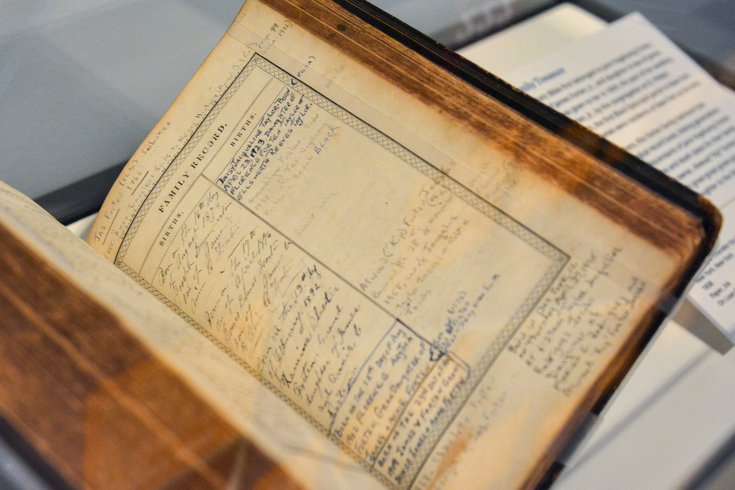
August 16, 2023
 Alex McKechnie/Museum of the American Revolution
Alex McKechnie/Museum of the American Revolution
Descendants of James Forten have donated a Bible, containing genealogical information from six generations of his family, to the Museum of the American Revolution. It will remain on display after the exhibit about the Forten family closes in November.
A new donation to the Museum of the American Revolution has a wealth of genealogical information about one of the most significant African American families in Philadelphia's history.
Atwood "Kip" Forten Jacobs and his daughter, Taylor Jacqueline Rodriguez Jacobs, direct descendants of Philadelphian abolitionist and Revolutionary War veteran James Forten, have donated their family Bible to the museum for "Black Founders: The Forten Family of Philadelphia," an exhibit seeking to educate visitors on the remarkable lives of James Forten and his family members in colonial Philadelphia. The Bible will remain on display when the exhibit closes in November.
The family Bible has been in the Forten family for six generations and has many records of births, deaths and marriages. The book, which is being made public for the first time, offers some of the only known evidence of the family's important life events over the past two centuries.
It first belonged to Jane Vogelsang Forten, the wife of James Forten, Jr. The bible was given to her in 1839, the year of her wedding, by the congregation of St. Philip's African Church in New York City. The couple were New York residents when they got married, according to museum officials.
Multiple descendants have added birth, marriage and death dates for extended family members. Future members of the Forten family will be able to visit the museum and add their information to the Bible's records.
"Even though I was born and raised in Philadelphia, I knew very little about James Forten and the Forten family," said Atwood Jacobs. "But thanks to Professor Julie Winch and her wonderful book, 'A Gentleman of Color: The Life of James Forten,' all of that changed. Consequently, it is an honor, and indeed a great pleasure, for me to donate my Forten family Bible to the Museum of the American Revolution. I believe it is the ideal venue to showcase such an important article of African American history."
"The Forten family Bible is a link to the past and a powerful reminder that we still have much work to build a more inclusive story of our nation's history that recognizes all of the people who have served, sacrificed, and strived to form a 'more perfect union,'" said Dr. R. Scott Stephenson, the museum's president and CEO. "It is an incredible honor to be entrusted with the care and preservation of this irreplaceable national treasure."
Forten, the grandson of a slave who obtained his own freedom, was born free in Philadelphia. He joined the Revolutionary War effort as a powder boy on the Royal Louis ship when he was 14 years old, carrying fuel for its cannons across the deck. When the British navy captured the ship, Forten became a prisoner of war while most other Black crew members were sold into slavery in the West Indies. Seven months later, he was dumped in New York and walked back to Philadelphia, where he started a successful sailmaking business.
In 1806, Forten married Charlotte Vandine. The couple had nine children, including Harriet, Margaretta and Sarah Louisa. The sisters, along with their mother, founded the Philadelphia Female Anti-Slavery Society, an abolitionist organization that lobbied politicians and aided fugitive slaves. Harmony Hall, as their home was known, was a stop on the Underground Railroad.
Forten later became aligned with William Lloyd Garrison, loaning him money to start his abolitionist newspaper The Liberator, to which Forten regularly contributed. He died in 1842 at the age of 75, and The Liberator dedicated weeks of coverage to Forten's life and legacy, calling his funeral "the largest that has been seen in Philadelphia for a great length of time."
The Forten family Bible is on display at the Museum of American Revolution as part of the ongoing "Black Founders" exhibit, which closes on Nov. 26. The exhibit is open daily from 11 a.m. until 5 p.m. The Bible, as well as the rest of the exhibit, can be viewed online through the museum's 360-degree virtual tour, which is free.